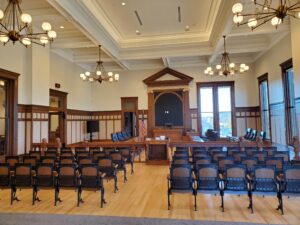Legislature approves $1.3 billion in additional state spending
 A bill to spend another $1.3 billion in the current fiscal year, largely for economic development incentives, cleared the Legislature this week and was sent to Gov. Gretchen Whitmer for final approval.
A bill to spend another $1.3 billion in the current fiscal year, largely for economic development incentives, cleared the Legislature this week and was sent to Gov. Gretchen Whitmer for final approval.
House Bill 4016 distributes money through no fewer than seven state departments, with the largest share, $800 million, going either to incentives for a Ford plant to be sited in Calhoun County and an additional investment in the state’s SOAR economic development fund.
In addition to those figures, the bill provides:
- $212 million for homeowners and landlords to do energy efficiency updates
- $63.5 million to increase Medicaid interim rates to nursing home providers (see more below)
- $25 million for grants to offset water bills for low income residents
- $10 million to reduce nitrogen, phosphorus and sediment in the waters of the Lake Erie and Saginaw Bay watersheds
MAC did not take a position on the legislation.
For more information on this issue, contact Deena Bosworth at bosworth@micounties.org.
 This week, the Michigan Supreme Court (MSC) held oral arguments in a case challenging a key source of revenue for local court operations. In People of MI v Travis Michael Johnson, MSC will decide the constitutionality of trial court judges levying fees against criminal defendants.
This week, the Michigan Supreme Court (MSC) held oral arguments in a case challenging a key source of revenue for local court operations. In People of MI v Travis Michael Johnson, MSC will decide the constitutionality of trial court judges levying fees against criminal defendants.
Prior to 2014, trial courts were able to impose operations fees on defendants. As a result of a 2014 Michigan Supreme Court ruling, trial courts were no longer authorized to levy such costs without statutory authorization by the Legislature. In response to said ruling, a MAC-led coalition convinced the Legislature to amend state law to allow trial courts to place “reasonably related” costs of prosecution on defendants but included the legislative sunset.
Michigan trial courts retain the authority to impose such fees, but only until May 1, 2024, when a legislative “sunset” occurs.
If the court rules against such fees prior to the implementation of a legislative solution, local courts face losing more than 26 percent of their current funding for operational costs. Counties would then be forced to backfill this gap, as local units of government are a main funding source for trial courts.
Members of the Legislature are working to implement funding recommendations of the Trial Court Funding Commission. And MAC is urging quick action to guard against a funding lapse via the creation of a Trial Court Fund to distribute funding to trial courts based on operational requirements, while maintaining local discretion over trial court operational decisions, and the establishment of uniform assessments and centralized collections through the State Court Administrator’s Office. This system will maintain judicial discretion for ordering fines, reduce costs and increase efficiency.
For more information on this issue, contact Samantha Gibson at gibson@micounties.org.
MAC-backed bills for tax reimbursement re-introduced
 Legislation to fully reimburse counties for property tax losses due to state-mandated exemptions for disabled veterans returned to the legislative slate this week.
Legislation to fully reimburse counties for property tax losses due to state-mandated exemptions for disabled veterans returned to the legislative slate this week.
Sen. Jon Bumstead (R-Muskegon) reintroduced his idea for reimbursements for disabled veterans’ property tax exemptions via Senate Bills 95–96. These bills, which failed to gain approval in the last legislative session, are the culmination of years of negotiations with the veterans organizations, the Legislature and local units of government. Locals have seen increasing losses due to the 2014 legislation mandating property tax exemptions for veterans with 100 percent disability.
As with last session’s versions, the bills create a refundable income tax credit to the veterans, payable to the local taxing units. Full reimbursement to counties for their losses due to the exemption is one of MAC’s top legislative priorities in 2023. However, the Michigan Department of Treasury remains opposed to Bumstead’s legislation.
The bills have been referred to the Senate Committee on Finance, Insurance and Consumer Protection.
Watch in future Legislative Updates and in MAC advocacy emails for ways that you, as county leaders, can become involved in bringing these bills through the Legislature.
For more information on this issue, contact Deena Bosworth at bosworth@micounties.org.
Legislature OKs nursing grants backed by county medical care facilities
 County medical care facilities (MCFS), caught in an ongoing and industry-wide staffing crunch, will receive state grants for workforce retention if Gov. Gretchen Whitmer signs House Bill 4016.
County medical care facilities (MCFS), caught in an ongoing and industry-wide staffing crunch, will receive state grants for workforce retention if Gov. Gretchen Whitmer signs House Bill 4016.
The Legislature approved HB 4016, the second supplemental budget of 2023, this week. It includes:
- $67 million in workforce retention grants to nursing home providers
- $63.5 million to increase Medicaid interim rates to nursing home providers, adjusting the interim rate to 4.5 percent, from 2.5 percent, retroactive to Jan. 1, 2023
The Michigan County Medical Care Facilities Council, which represents Michigan’s 34 county-operated MCFs, supports these investments.
For more information on this issue, contact Samantha Gibson at gibson@micounties.org.
MAC studying ‘unique’ proposal on handling property tax disputes
 MAC has begun an internal review of a unique property tax proposal unveiled recently by Sen. Ed McBroom (R-Dickinson).
MAC has begun an internal review of a unique property tax proposal unveiled recently by Sen. Ed McBroom (R-Dickinson).
His Senate Bills 19–20 would create a county “Board of Revision” and vest all commercial, industrial and development real property — as well as commercial, industrial and utility personal property assessment appeals and decisions — to that body, bypassing the Michigan Tax Tribunal.
This appeals process would consider all property valued at $600,000 or more. Further challenges to decisions by the Board of Revision could be appealed directly to local circuit court.
The bills have been referred to the Senate Committee on Finance, Insurance and Consumer Protection.
MAC’s Finance and General Government Committee will review the legislation before the association takes any position on the bills.
For more information on this issue, contact Deena Bosworth at bosworth@micounties.org.
Wayne’s Palamara touts MAC effort to aid opioid investment strategies

“County governments — charged with the delivery of public health services at the local level in our state — are on the frontlines of the overdose crisis in their communities. We now have the opportunity to create monumental change by making the best choices to help our families, friends and neighbors make the right ones,” Wayne County Commissioner Joe Palamara wrote in the Detroit Free Press this week to tout MAC’s opioid settlement assistance efforts.
In his opinion column posted online March 1, Palamara, a long-time member of the MAC Board of Directors, noted MAC’s Michigan Opioid Settlement Funds Toolkit: A Guide for Local Spending, developed by Amy Dolinky, MAC’s technical adviser for opioid settlement funds planning and capacity building.
Dolinky and Vital Strategies, a health policy nonprofit partnering with MAC in this work, already have been in contact with nearly half of Michigan’s counties to answer questions or provide expertise as local leaders decide how best to employ settlement funds to address substance abuse disorders.
Additional information and service details can be found on MAC’s Opioid Settlement Resource Center.
For any questions on opioid settlement funds, contact Dolinky at dolinky@micounties.org.
Cheboygan, Genesee leaders honored for energy efficiency work
![]() Jeffery Lawson, administrator of Cheboygan County, and Deborah Cherry, Genesee County treasurer, recently were honored by Lean & Green Michigan with “Most Valuable PACEsetter” awards for 2022.
Jeffery Lawson, administrator of Cheboygan County, and Deborah Cherry, Genesee County treasurer, recently were honored by Lean & Green Michigan with “Most Valuable PACEsetter” awards for 2022.
The pair were honored “for their dedication to helping businesses in their communities access capital to finance energy and water efficiency projects as well as renewable energy.”
Founded in 2012, Lean & Green Michigan, a corporate member of MAC, is a public-private partnership that helps local units of government administer Property Assessed Clean Energy, or PACE, financing. Since its inception, Lean & Green Michigan has closed 65 deals throughout the state and helped Michigan businesses access more than $207 million in private capital.
Genesee County joined Lean and Green’s PACE district in October 2014 and closed their first project, Linden Senior Living, in February 2022. The case study can be found here.
Cheboygan County joined in May 2022 and expects to close on its initial project in the coming year.
PACE is a financing tool that allows a commercial property owner to voluntarily enter into a special assessment agreement with a local unit of government, which can be repaid over a period of up to 25 years. It enables cash flow positive investment in comprehensive energy efficiency, water efficiency and renewable energy projects. By financing such projects through PACE, businesses can eliminate the need for upfront capital and benefit from PACE’s long-term, fixed-rate financing structure so that the savings generated from the project are greater than the annual PACE loan repayment — generating immediate positive cash flow.
For more information on PACE, click here.
 Staff picks
Staff picks
- Report: Traffic-related pedestrian deaths are trending up — again (American City and County)
- Looming cuts to emergency SNAP benefits threaten food security in rural America (Kaiser Health News)
- State awards $3.6 million for invasive species projects (Michigan Department of Natural Resources)
- A road map for dealing with government’s workforce crisis (Governing)
